Arab Center Washington DC (ACW) conducted a public opinion survey in the Arab world in cooperation with the Arab Center for Research and Policy Studies (ACRPS) based in Doha, Qatar. This is the first in-depth examination of Arab perceptions, spanning eight Arab countries, of President Donald Trump and his policy positions. The poll surveyed a randomly selected sample of 3,200 respondents in eight Arab countries, namely Egypt, Jordan, Kuwait, Lebanon, Morocco, the Palestinian Territories (the West Bank and the Gaza Strip), Saudi Arabia, and Tunisia, with an average of 400 respondents from each country. Polling was carried out between September 14th and October 13th, 2017. Interviews were conducted by telephone.
The sample was designed using the quotas method by gender, age, rural-urban divide, governorates, etc. The phone numbers of the contacted sample were gathered using a nationally representative, random, clustered, stratified, multi-stage area probability sample. This ensured that each individual within a country had an equal likelihood of being included in the sample. The sample was selected using a process which randomly generates phone numbers, taking into account all local operators in each country. As a result of this sampling method, the country-level samples used in this survey are representative of the respective populations aged 18 years or older. The resultant margin of error for each country-level sample is ±5%.
Refusal rates were surprisingly high, compared to surveys we conducted in previous years; on average, 40% of those contacted refused to participate in the survey. The highest refusal rates were in Saudi Arabia (56%), Egypt (49%), and Kuwait (45%). This might be due to the current political environment where these countries’ leaders’ have good relations with President Donald Trump and those contacted may have been concerned about expressing any views related to President Trump that might disagree with those of their governments. Therefore, the results from these countries should be interpreted with caution, as they may reflect the views of those who are more likely to support their leadership.
Among the 3,200 individuals who agreed to participate in the survey, the sample consisted of 51% males and 49% females. All respondents were 18 years of age or older at the time of the survey, with almost half (48%) under the age of 35. Respondents between ages 35 and 44 represented 21% of the survey, whereas 15% were between 45 and 54 and 17% above 55. In terms of education levels, 4% of respondents were illiterate, 16% had some schooling, 29% completed high school, 20% had some college education, 25% held an undergraduate degree, and 6% had a graduate degree.
Below is a summary of the findings of this survey.
SECTION I: Attitudes toward the United States
When asked about their general views of the United States, almost half of the Arab public surveyed expressed positive views (48%).
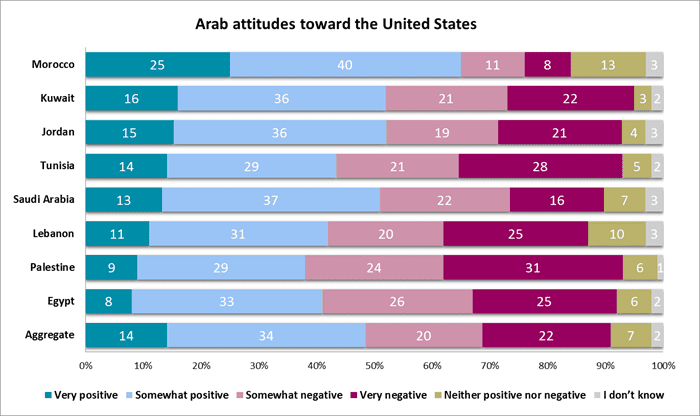
A person’s perception of the United States also correlates with age and education; simple cross tabulations and analysis of variance (ANOVA) testing show that having more education correlates with a more positive view of the US, as does being younger. The ANOVA tests prove that the relationship between age and education with opinion of the US is highly statistically significant.
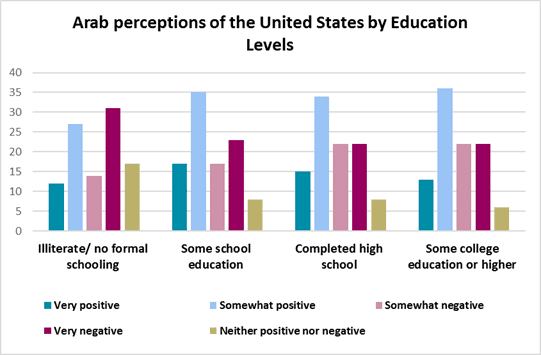
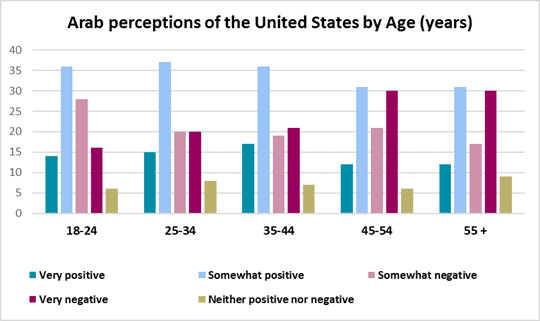
However, consistent with similar public opinion polls, there is a strong negative impression of US foreign policy. Overall, 61% of Arabs surveyed have a negative or somewhat negative attitude toward US policy in the Arab world, in contrast to only 25% who expressed negative or somewhat negative views of the American people.
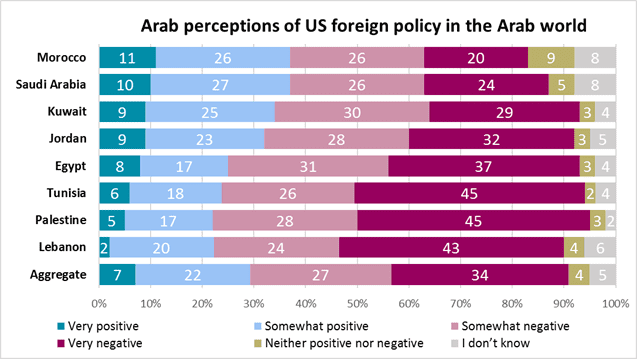
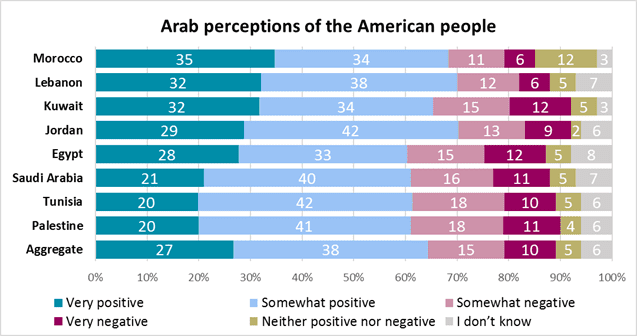
The survey shows that anti-American sentiment in the Arab world targets US foreign policies in the region, and not the United States as a country or its population.
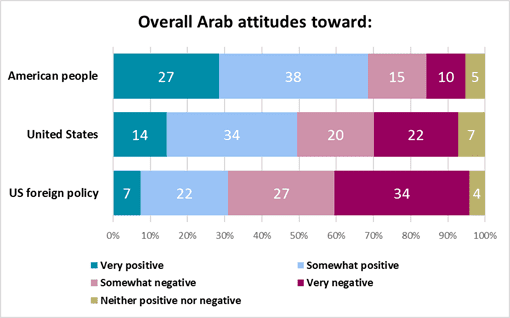
Of the Arab countries surveyed, respondents in Morocco (37%), Saudi Arabia (36%), and Kuwait (34%) expressed the most overall positive views of US foreign policy toward the Arab world. Meanwhile, respondents in Lebanon (66%) and Palestine (73%) expressed the most negative views. Regarding attitudes toward the American people, Jordanians and Lebanese hold the most positive views, at 71% and 70% within each population, respectively.
Interestingly, education levels were not an important determinant of perceptions of US foreign policy. ANOVA testing, however, shows statistically significant differences among the age groups, such that older age groups are correlated with a more negative view of American foreign policy.
It is worthy to note that there has been a slight regression in Arab public attitudes toward the American people since the same question was asked a year ago, in October 2016. From a sample of 3,600 in nine Arab countries, 73% expressed positive overall views of the American people in October 2016 compared to 65% of respondents surveyed in September-October 2017. This is likely a result of negative impressions of President Trump, and a negative perception of his election by the American people.
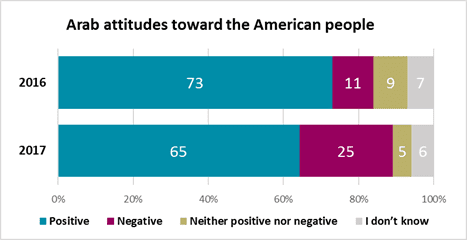
SECTION II: Arab Perspectives on Donald Trump
The majority of Arab respondents (58%) had a negative view of US President Donald Trump. Even in countries with governments friendly toward the Trump Administration, such as Saudi Arabia, the largest proportion of respondents (49%) had negative overall views of the US president.
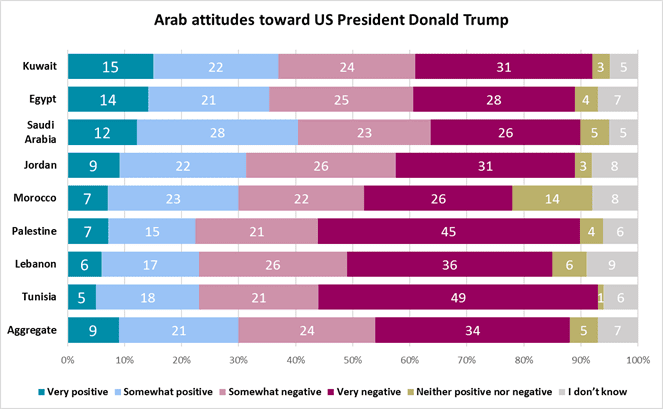
When splitting the sample up across gender, we find statistically significant differences among male and female respondents on this issue (difference of means tests significant at the p<0.05 level). A larger proportion of women had negative views of Trump (at 64%) than men (at 60%). Additionally, among those who had positive views of Trump, there was also a statistically significantly difference by gender (31% female, 35% male).
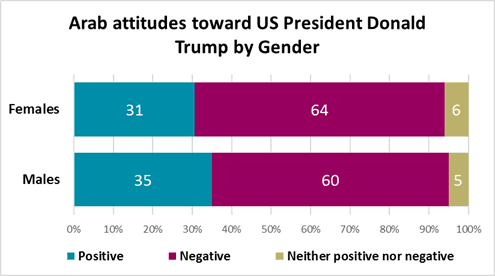
We found no statistically significant differences on education or age levels, however. This suggests that positive and negative perceptions of President Trump are gendered, a finding consistent with other US and international polls on this topic.
When asked about Trump’s characteristics however, responses were less consistent, with an average of 15% of responding with “I do not know.”
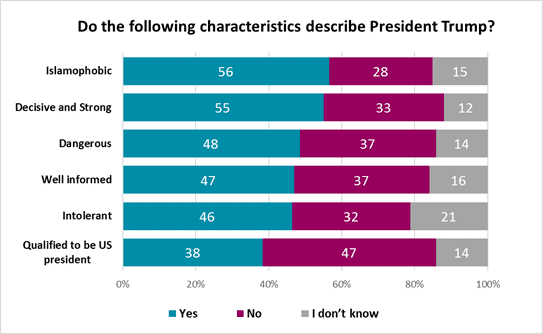
When asked whether Trump seemed anti-Muslim or Islamophobic, the majority (56%) viewed Trump as indeed anti-Muslim. High rates of non-response characterized particular countries, such as Saudi Arabia and Morocco. Despite the self-selection of respondents on this question, a larger portion of Saudi Arabians (44%) viewed Trump as anti-Muslim as well.
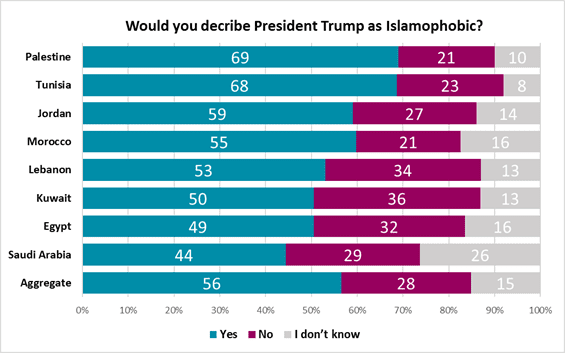
Overall, the majority of Arab respondents (51%) believed that the Trump presidency has diminished US standing in the world, with the overwhelming majority among Tunisians (68%) and Palestinians (62%).
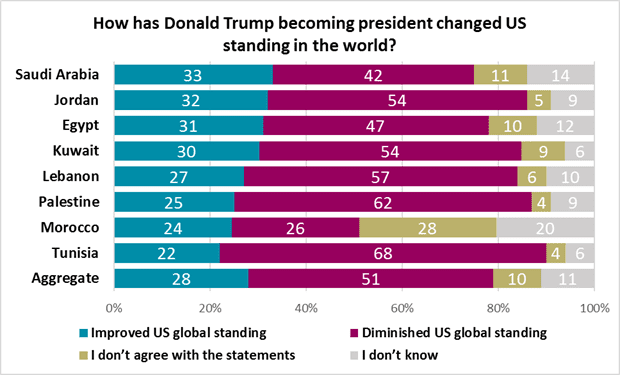
There is also an overwhelming lack of support for the “Muslim ban” (President Trump’s order to ban individuals from Muslim-majority countries from entering the United States) across all the countries in our sample. A full 76% stated they disagreed with the policy. It is important to note that none of the countries included in our survey were actually included in the Muslim ban, and yet perception of this action was overwhelmingly negative. These sorts of policies, as well as perceptions of Trump as anti-Muslim, go toward explaining his overall negative perception among Arab respondents.
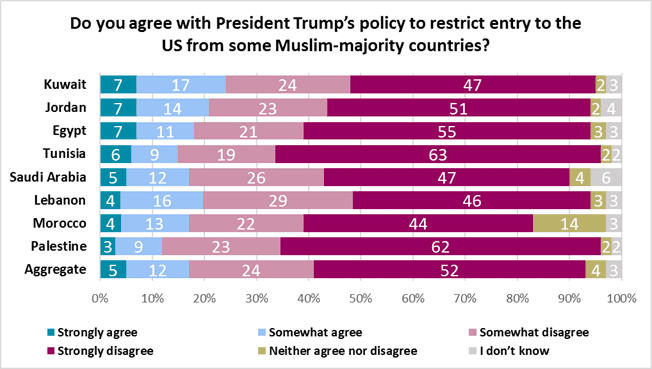
Additionally, very few believe that Trump’s presidency has improved US policy toward the Arab world (17%), most of whom were in Saudi Arabia (24%), Egypt (22%), and Kuwait (22%). The majority believed that President Trump has negatively impacted US policy in the Arab world (38%) or that it remained the same (38%).
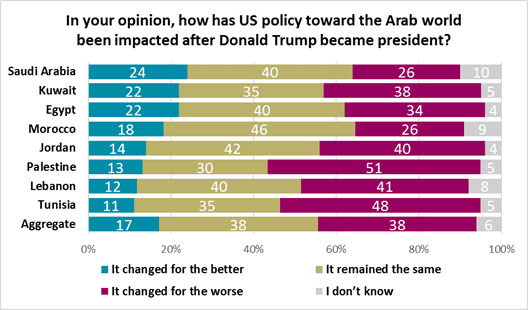
SECTION III: Arab Assessment of Trump’s Middle East Policy
In general, the Arab public’s assessment of President Trump’s policies toward the Arab world is overwhelmingly negative at 61%. More positive views were found among respondents from Saudi Arabia (38%), Kuwait (35%), Egypt (34%), and Morocco (33%).
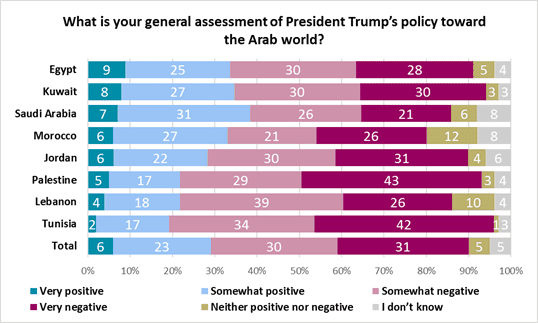
Regarding policies toward specific countries, the bulk of Arab respondents perceived Trump’s policies as negative as well. For instance, when asked about Iraq, two thirds of the respondents (66%) felt that Trump’s policy toward Iraq was poor. Age was a significant determinant here; those in the youngest age group (18-24) were the most ambivalent. Of those aged 18-24, 12% were neutral in their assessment, significantly more than any other age group.
Regarding policies toward Yemen, 59% of respondents overall felt negatively about Trump’s policies toward the Yemen crisis. Tunisian and Palestinian respondents had the most negative perception (70% and 68%, respectively). Differences of means testing across education levels show significant differences (at p<0.05 level), with more educated respondents having more negative perceptions of Trump’s handling of the Yemen crisis. The more educated respondents also had a less neutral stance than those in the lowest education category.
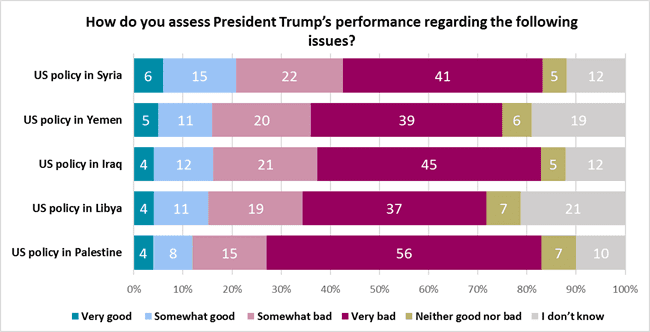
Similarly, over a number of specific issue areas, the majority of respondents perceived Trump’s policies to be mostly negative. The more positive assessment of Trump’s “maintaining relations with Arab allies” might be a reflection of the respondents’ countries and their relationships with the United States, as well as high refusal rates.
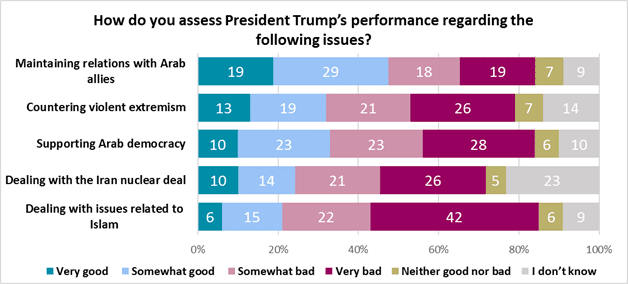
The largest proportion of respondents perceived Trump’s policies toward the Iran nuclear deal as negative (47%), though a full 23% of respondents said they do not know. This could imply a number of reasons, including the sensitivity of the topic in particular countries, as well as simply the lack of political knowledge on the Iranian nuclear deal given that Iran’s engagement in the region is perceived as problematic as a result of its direct military involvement rather than its nuclear program.
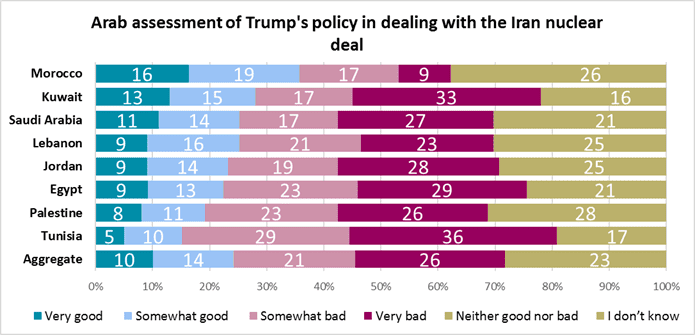
On this issue, both education and age were relevant determinants of perception (ANOVA testing was statistically significant at the p<0.05 level). Less educated respondents had somewhat more positive perceptions (22% very positive perception compared to 17%, 14%, and 11% of other education categories), and the youngest respondents were more ambivalent (11% neutral perception compared to 7%, 6%, 4% and 6% of other age groups).
When asked whether Trump’s policies have contributed to eradicating the Islamic State (IS), the majority of respondents (58%) disagreed, while 30% agreed and 11% did not know.
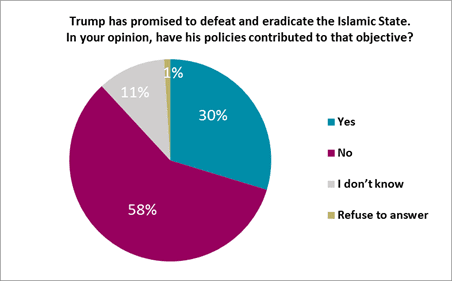
SECTION IV: Arab Perspectives on Trump’s Middle East Policy Priorities
Regarding the top issues that Trump should focus on, the largest proportion (33%) of respondents believed the US should not intervene at all in the affairs of Arab countries, up from 28% when this survey was conducted in November of 2016. The second largest proportion, 23%, indicated that solving the Israeli-Palestinian conflict should be the major goal of US foreign policy; expectedly, Palestinians and Jordanians had the highest rates on this topic (36% and 26%, respectively). The third largest proportion, at 20%, believed resolving ongoing crises in Iraq, Syria, Libya, and Yemen should be the most important goal of US foreign policy makers. Finally, it is important to note that “supporting democratic transitions” and “military engagement” had the lowest rates of support, at 9% and 6%, respectively, which is in line with the general sentiment that the United States should not be involved at all in the affairs of Arab countries; but it also indicates that military intervention, in particular, is least supported.
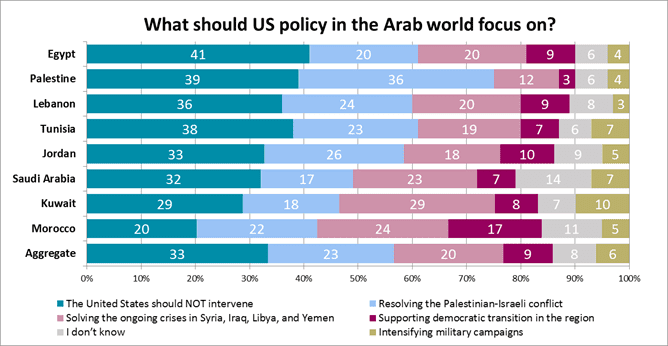
When asked about their opinion regarding the recent GCC crisis, the majority of Arab respondents (55%) said they would prefer that the US not be involved in resolving the conflict. Additionally, Arab respondents (56%) do not support US cooperation with Russia in Syria. Interestingly, Lebanese respondents agreed the most (49%) with this cooperation, while Moroccan and Saudi respondents agreed the least, at 22% and 16%, respectively.
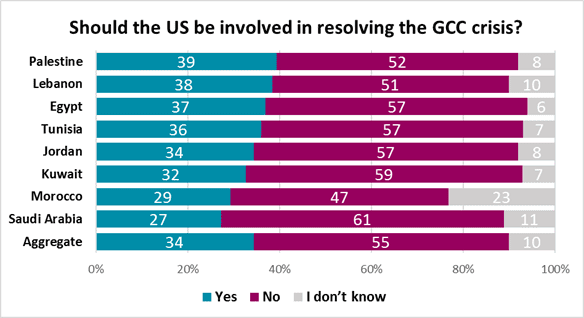
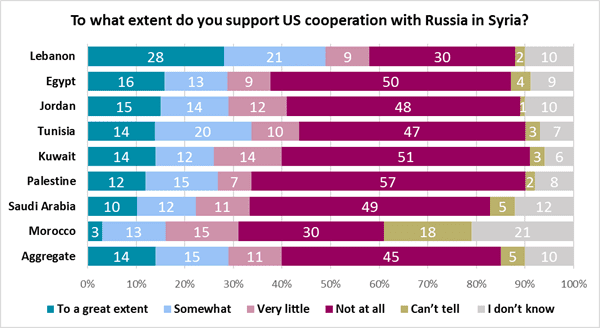
On the issue of US arms sales to Arab states and whether this helps stabilize the region, 62% of respondents answered, “No, US arms sales do not help stabilize the region.” Every country in the sample, except Saudi Arabia, had a majority of respondents answer negatively. Saudi respondents also had the highest “I don’t know” responses to this question, indicating refusal to answer one way or another.
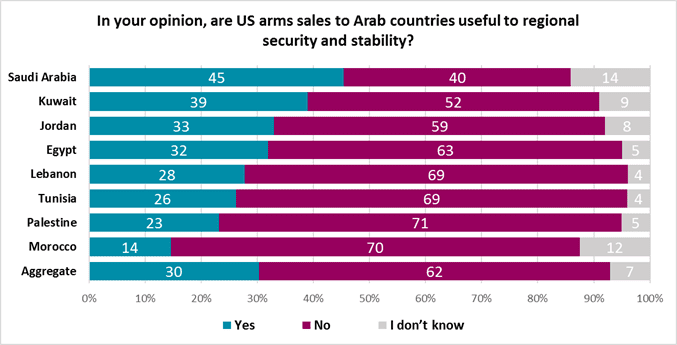
Further examination of the Saudi sample shows that age and education are important determinants of the response to this question (at the p<0.05 level). Those in older age groups were more likely to perceive US arms sales as stabilizing. Interestingly, analysis of responses across education levels shows that pro- and anti-arms sales sentiment is almost split in each education level, except the level of high school education. Among those who have only attained a high school diploma, the majority (64%) are pro-US arms sales.
SECTION V: The Issue of Palestine
As previously noted, “solving the Israeli-Palestinian conflict” was the second largest category in the question regarding the policies Trump should pursue as president. Given the relevance of this topic, respondents in this survey were asked a number of questions regarding Palestine and the resolution of the conflict.
First, when asked about Trump’s policies toward the Palestinian issue, 71% of all Arab respondents had generally negative perceptions of the president’s policies. The highest rates of disapproval were in Tunisia (87%) and in Palestine (75%). Once again, it is important to note that certain countries, such as Saudi Arabia, have a high rate of refusal on this question at 18%. Further ANOVA testing shows no significant differences, signaling that the perception that Trump is doing poorly in his Palestine-related policies is a general sentiment across a number of socioeconomic groups.
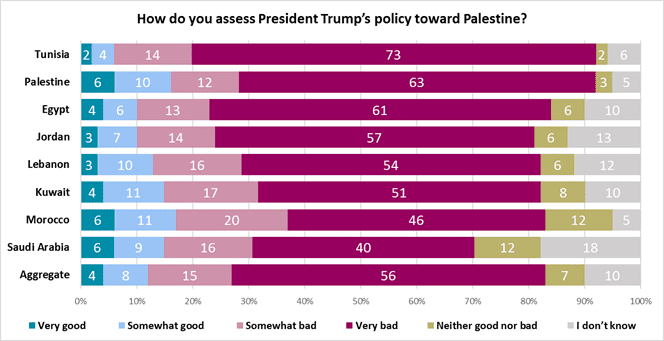
On the topic of the Israeli-Palestinian conflict and, specifically, the success of peace talks, again the vast majority of Arab respondents (72%) were pessimistic about the success of the Trump Administration. On this question, education and age were highly significant indicators of perception (at the p<0.01 level). Younger respondents and less educated respondents were also relatively more optimistic, though the less educated respondents were less able to gauge their level of optimism at all.
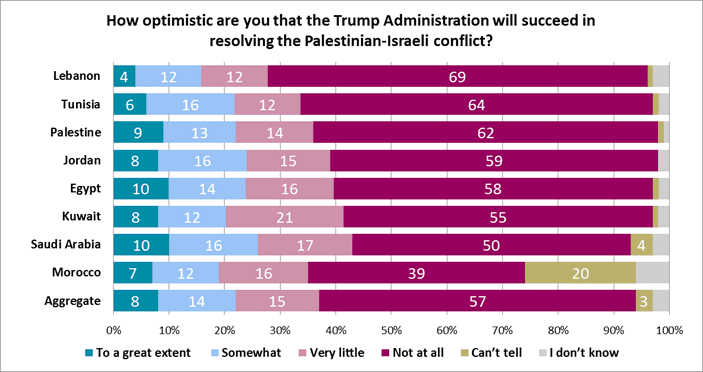
Overall, the importance of the Palestinian issue is still high among the vast majority of respondents (88%), with 74% gauging the issue of Palestine as “very important” to them personally. Although support for the Palestinian cause is still widespread and significant among Arab publics, Kuwait, Saudi Arabia, and Morocco had the highest rates of respondents who perceived the Palestinian issue as unimportant (19%, 16%, and 15% respectively). This still represents a small minority of respondents within those states, as the overwhelming majorities of those in all surveyed Arab countries considered the Palestinian cause as “very important” or “somewhat important.”

Again, age and education were important determinants (with statistical significance at the p<0.01 level). Those with higher education levels were more likely to answer that the Palestinian issue was important to them, as were older respondents. For instance, 83% of respondents 55 years and above gauged the Palestinian issue as “very important,” whereas 66% of respondents aged 18-24 held the same opinion.
Conclusion
Taken in aggregate, this survey shows that Arab respondents have a nuanced view of the United States, US foreign policy, and the Trump Administration in particular. Respondents can clearly differentiate between the United States as a country, the American people, and the policies of particular administrations. They do not support arms sales to Arab governments, nor do they support direct military intervention. Instead they support resolving ongoing crises across the region, including the Israeli-Palestinian conflict and the instability in Iraq, Syria, Libya, and Yemen.
The findings herein are not surprising when compared to the Arab public opinion survey conducted by Arab Center Washington DC in October 2016 polling Arab attitudes toward then-US presidential candidates Hillary Clinton and Donald Trump. The majority of the 3,600 respondents from nine Arab countries (56%) held positive views of the Democratic Party’s candidate Hillary Clinton, while 20% held positive views of the GOP candidate Donald Trump (60% held negative views of then-candidate Trump). Overall, 60% of the Arab public favored Clinton as US president, in contrast to only 11% who preferred Trump. As such, present negative views and assessments of President Trump and his policies among the Arab public are expected.
The findings are also consistent with US favorability ratings and global surveys. In fact, the Arab public seems to have more positive views of Trump (at 30%) than the global public polled in other surveys (e.g., in one survey only 22% rated Trump favorably). This is also not far from the views of the general public in the United States, where President Trump currently garners 37% approval rating. With the unpredictability of the Trump Administration, it remains to be seen how capricious policies and actions by President Trump in the coming years will change the views of the Arab public. If the Trump Administration is to take the Arab region seriously, the views of the Arab publics cannot be ignored.
Download PDF